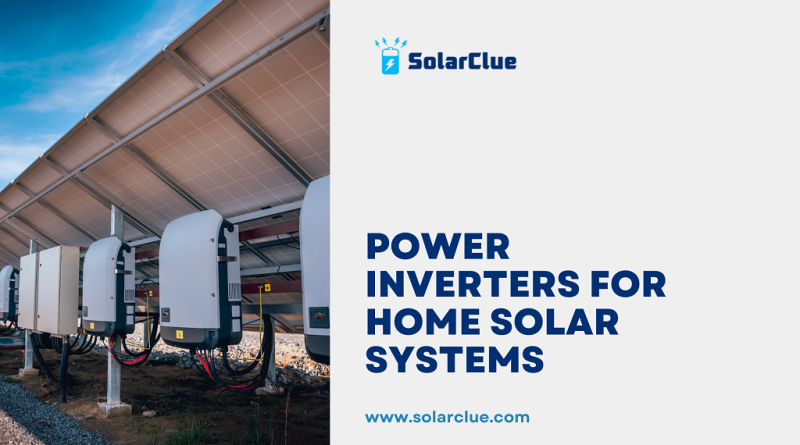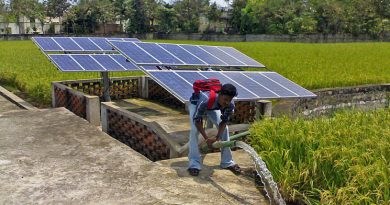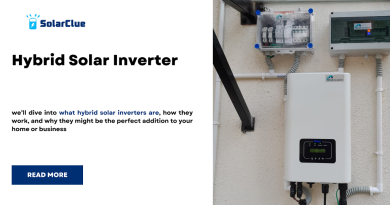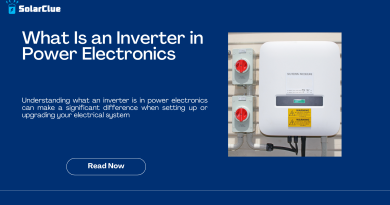Power Inverters for Home Solar Systems
Switching to solar energy for your home is more than just a trend; it’s a commitment to a sustainable future. However, to make the most of your solar panels, you need a power inverter. Think of it as the heart of your solar system, converting the energy captured from the sun into electricity that your home can use. If you’re considering installing a solar power system or upgrading your current setup, understanding how power inverters work and choosing the right one is crucial. In this guide, we’ll break down everything you need to know about power inverters for home solar systems.
Table of Contents
What is a Power Inverter in a Home Solar System?
A power inverter is a device that converts the direct current (DC) electricity generated by solar panels into alternating current (AC) electricity, which powers your home’s appliances. Solar panels absorb sunlight and generate DC power. However, since homes run on AC power, an inverter is necessary to make that energy usable.
To put it simply, while your solar panels are the source of energy, the inverter is what makes that energy functional for everyday use.
Why is a Power Inverter Essential for a Home Solar System?
- Energy Conversion: The most important function of a power inverter is converting DC electricity to AC. Without this conversion, the energy generated by your solar panels would be unusable.
- Safety: Modern inverters come with built-in safety features to protect both your home and the solar system. They can automatically shut down in case of an issue, preventing potential damage or accidents.
- System Monitoring: Many power inverters come with monitoring capabilities that allow you to track your energy production and usage. This helps in optimizing your energy consumption and understanding your solar system’s performance.
- Grid Interaction: If your home is connected to the electrical grid, an inverter manages the interaction between your solar system and the grid. It ensures that excess energy can be sent back to the grid, often allowing you to earn credits or payments.
Types of Power Inverters for Home Solar Systems
Choosing the right type of inverter is crucial for maximizing the efficiency and reliability of your solar power system. Here’s a breakdown of the main types:
- String Inverters
- Description: This is the most common type of inverter used in residential solar systems. All the solar panels are connected in series to form a “string,” and the DC power generated is converted to AC by a single inverter.
- Pros: Cost-effective and simple installation.
- Cons: Performance can be affected if even one panel is shaded or damaged.
- Microinverters
- Description: Microinverters are small inverters attached to each solar panel. Each panel’s DC power is converted to AC individually, which means that each panel operates independently.
- Pros: High efficiency, especially for homes with shading issues.
- Cons: More expensive upfront and requires more labor to install.
- Power Optimizers
- Description: Power optimizers are similar to microinverters, as they are installed on each panel. However, they don’t convert DC to AC directly; instead, they optimize the DC power before sending it to a central inverter.
- Pros: Better performance in shaded conditions, more affordable than microinverters.
- Cons: Requires a central inverter, adding to overall system complexity.
- Hybrid Inverters
- Description: Hybrid inverters are designed to work with both solar panels and battery storage. They convert DC to AC and manage the storage and usage of energy from batteries.
- Pros: Ideal for systems with battery storage or plans to add batteries later.
- Cons: More expensive than standard inverters.
Choosing the Right Power Inverter for Your Home Solar System
Selecting the right inverter depends on several factors, such as your energy needs, budget, and the design of your home. Consider the following when making your choice:
- Energy Consumption: Understand your household’s daily and monthly energy needs. This will help you choose an inverter with the right capacity.
- Roof Design and Shading: If your roof has multiple angles or shading issues, microinverters or power optimizers might be the best choice.
- Future Plans: If you plan to add battery storage in the future, consider a hybrid inverter.
- Budget: While string inverters are the most cost-effective, microinverters and power optimizers offer better performance in certain conditions, albeit at a higher cost.
Below is a comparison table to help you make an informed decision:
| Inverter Type | Best Suited For | Advantages | Considerations |
|---|---|---|---|
| String Inverter | Uniform roofs, budget-conscious | Affordable, easy installation | Performance affected by shading |
| Microinverter | Shaded roofs, complex installations | Independent panel operation, high efficiency | Higher initial cost |
| Power Optimizer | Partial shading, optimized output | Improved efficiency, panel-level management | Requires central inverter |
| Hybrid Inverter | Battery storage, future-proofing | Versatile, supports battery integration | More expensive upfront |
How to Install and Maintain a Power Inverter
Installation: Professional installation is recommended for any home solar system, especially when it comes to inverters. A certified installer will ensure that the system is set up correctly, safely, and efficiently. They will also handle the necessary permits and inspections required by local authorities.
Maintenance: Power inverters are generally low-maintenance devices. However, regular checks are important to ensure they’re functioning correctly. Most inverters will only need a visual inspection and software updates as necessary. If your inverter is connected to a monitoring system, it will alert you to any issues that need addressing.
Benefits of a Reliable Power Inverter for Home Solar Systems
- Energy Independence: By converting solar energy into usable electricity, a power inverter allows you to rely less on the grid, providing more control over your energy supply.
- Cost Savings: A well-chosen inverter maximizes the efficiency of your solar panels, leading to greater savings on your electricity bills.
- Environmental Impact: Using solar energy reduces your carbon footprint and contributes to a healthier environment.
- Increased Home Value: Homes with a solar power system often see an increase in property value, making them more attractive to potential buyers.
Common Myths About Power Inverters in Solar Systems
- Inverters Are Too Complicated: While the technology behind inverters is complex, using and maintaining them is straightforward, especially with the help of a professional installer.
- All Inverters Are the Same: Different types of inverters are designed to meet different needs. Choosing the right one can significantly affect the performance and efficiency of your solar system.
- Inverters Require Constant Maintenance: Inverters are low-maintenance. A simple annual check-up is often enough to keep them running efficiently.
Conclusion
A power inverter is more than just a component of your home solar system—it’s what makes the entire system work. By converting the sun’s energy into electricity that powers your home, the inverter is key to unlocking the full potential of solar energy. Whether you’re starting from scratch or upgrading an existing system, choosing the right inverter is essential for maximizing your solar investment.
If you’re still unsure about which inverter is best for your needs, consulting with a solar expert can provide valuable insights tailored to your specific situation. With the right information and guidance, you can enjoy the benefits of clean, renewable energy for years to come.
Visit SolarClue® to see the best Solar Inverter. SolarClue® actively sells solar energy products at discounts of up to 50% on its online marketplace.
FAQs
- What is a power inverter in a solar system?
- A power inverter converts the DC electricity produced by your solar panels into AC electricity, which is used to power your home’s appliances.
- Can I use a solar system without a power inverter?
- No, without an inverter, the electricity generated by your solar panels would not be usable for your home.
- What is the lifespan of a power inverter?
- Most power inverters last between 10 to 15 years, depending on usage and maintenance.
- What type of inverter is best for a home solar system?
- The best type depends on your specific needs, such as roof design, shading, and whether you plan to add battery storage in the future.
- Is it easy to upgrade my inverter later?
- Yes, if your energy needs change or you decide to add a battery storage system, you can upgrade your inverter accordingly.
Switching to solar energy is a powerful step towards sustainability, and with the right power inverter for your home solar system, you’ll be well on your way to enjoying clean, reliable energy.




